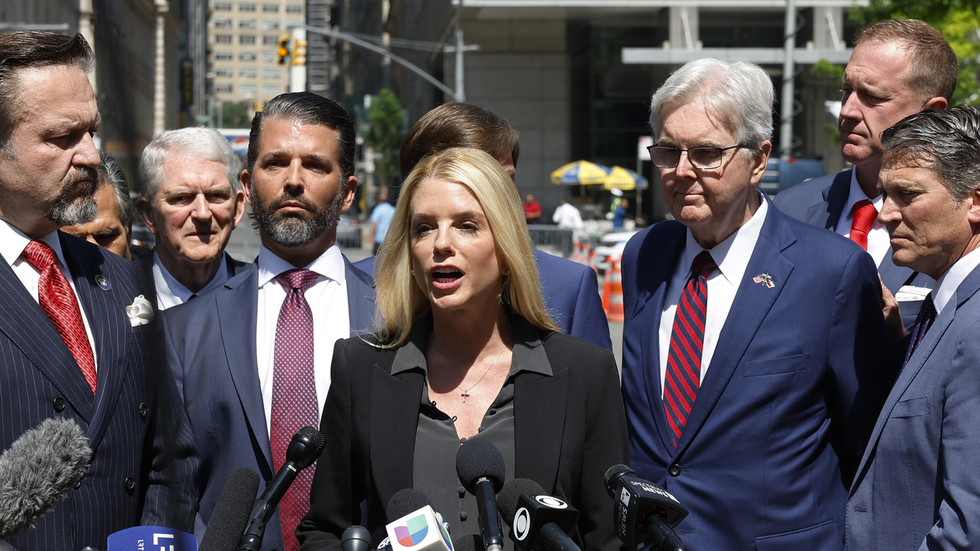Foreign Affairs
Putin’s deployment of an intermediate-range ballistic missile shows that his responses to escalation are calibrated—and serious.

What could possibly go wrong? The president, now perhaps in name only, reportedly decided to loose American munitions on Russia, a step avoided even during the Cold War. Moscow’s response was to use a nuclear-capable hypersonic intermediate-range ballistic missile against Ukraine. The American people, more focused on the coming Thanksgiving holiday than the latest eruption in Europe’s deadly proxy war, yawned. Ukraine and its European acolytes, however, held emergency talks and demanded action, meaning a U.S. response.
Never has it been so dangerous to be a great power, for both the dominant great power and the wannabe imperial power. The United States began its history by emphasizing its distance from Europe. The Monroe Doctrine, claiming the Western Hemisphere as America’s own, was arrogant presumption when first issued in 1823. Within a few decades, however, no foreign power could seriously challenge the U.S. in its neighborhood. In reality, America was already one of the most secure nations ever established, in practice vulnerable only to internal conflict.
When World War II ended, the Old World had wrecked itself twice in little more than a generation. America enjoyed global preeminence, which turned into primacy after the demise of the Soviet Union and its satellite system. Then came George H.W. Bush’s infamous “what we say goes,” when the Monroe Doctrine was inverted to mean that Washington expected no challenge when it intervened up to every other nation’s border, and sometimes within those nations as well. U.S. policymakers seemed to believe that America was the eternal unipower.
Yet President George W. Bush and his more arrogant than merry band crashed the glorious bandwagon just a few years later. Manipulated into war on a lie, Uncle Sam destabilized the Mideast, wrecked multiple nations, left hundreds of thousands of civilians dead, and loosed deadly new geopolitical viruses upon the world. It was “a heckuva’ job!” by the younger Bush and his successors. We continue to pay the price today.
The biggest miscreants, however, were President Bill Clinton and the triumphalists around him, who not only treated Russia as a defeated nation but expected it to gamely bear its diminished status. In 2007 Vladimir Putin, who once sought inclusion in the Western order, announced that Russia accepted neither Uncle Sam’s militaristic pretensions nor NATO’s race eastward. Oblivious, Washington and Brussels officials missed their chance to turn the end of the Cold War into an enduring peace with the former KGB operative and his gang of nationalists. That illusion finally died in 2014 when Putin responded to the allies’ encouragement of a street putsch against Ukraine’s elected president by seizing Crimea and backing separatism in the Donbas.
That, however, is not the most frightening aspect of U.S. and allied behavior. Far worse, with a gaggle of Western leaders convinced that Moscow would passively accept every insult, indignity, and threat, the West is now firmly, and increasingly directly, at war with Russia. The fact that Putin has not launched a nuclear first strike on America is taken as evidence that the allies can indirectly target Russia with their missiles with no consequences. This assumption is both reckless and stupid.
Reckless because confronting a great and especially nuclear power over interests that it views as existential risks sacrificing everything. In 1962 the Soviet Union was the challenger and almost provoked the U.S. to war, one which would probably have gone nuclear. American policymakers—they matter most because the U.S., not Europe, would be the major combatant against Russia—must ask whether Ukraine is worth that risk. Presidents Franklin D. Roosevelt, Dwight Eisenhower, Lyndon B. Johnson, and Ronald Reagan wisely said no to intervention when the USSR imposed its will on, respectively, Poland, Hungary, Czechoslovakia, and Poland again. There is no more convincing reason to go to war with Moscow over Kiev’s status today.
Stupid because Russia continues to demonstrate its ability and willingness to respond, even if only indirectly so far. Russia likely is responsible for multiple instances of sabotage, including, most recently, cutting communication cables between Germany and Finland. As relatively open societies which have generally left unpleasant duties like security to America, the European states are vulnerable to a heightened campaign against major infrastructure.
More significant has been Moscow’s rising cooperation with China, Iran, and North Korea. This has been mistakenly presented as a new “axis” of sorts. Pyongyang and Tehran previously worked together as fellow pariah states. Beijing long has had close if difficult relations with the North and developed important economic ties with Tehran even while supporting nonproliferation. China and Russia had become friendlier as their relationship recovered from the 1969 border battle.
The recent increase in cooperation is all about Moscow, which has intensified its relations with the other three countries, dramatically increasing military links with Iran and North Korea, and abandoning its commitment to contrary policies, such as nonproliferation. In short, this supposed “axis of upheaval” is primarily a response to allied policy. And it could get worse, much worse. Beijing wants to build quieter subs. Pyongyang wants to deploy ICBMs capable of carrying multiple warheads and targeting the U.S. Tehran probably wants to become nuclear-capable. Russia could help all three do so. And doing so might seem to be the perfect riposte to the allies’ indirect defense of Ukraine, which now means enabling attacks on Russian territory and people. Moscow, too, could play that game.
Finally, the undeniable allied threat against Russia is spurring the latter’s technological advancement. The hypersonic Oreshnik reportedly reached Mach 11 and carried six warheads, each of which could release six smaller munitions. The missile is experimental and as yet Russia lacks a significant stockpile of them. However, Moscow has demonstrated an impressive ability to innovate and deliver, despite Western sanctions.
Ukraine took notice. The Rada cancelled its next session, fearing that it might be a target. President Volodymyr Zelensky called on “the world to sound serious in response—to make Putin really afraid of expanding the war and feel the real consequences of his actions.” But wasn’t that the idea behind shipping weapons to Ukraine and reducing restraints on their use? Contrary to the claim that Russia was a paper tiger, unwilling to respond to Western escalation, Putin has carefully calibrated his response.
Some European leaders recognize the serious challenge. Czechia’s Foreign Minister Jan Lipavský denounced what he termed an “escalatory step and an attempt of the Russian dictator to scare the population of Ukraine and to scare the population of Europe.” He said that Prague would not restrict the use of its weapons given to Ukraine. However, America and other European states already have begun doing that. Moreover, Czechia is a rounding error when it comes to European security. If things go really bad—the Putin government has recently reduced its official threshold for using nuclear weapons—the U.S., not the Czech Republic, will be tasked with defeating Russian Bear.
Subscribe Today
Get daily emails in your inbox
The bizarrely insouciant attitude of America’s foreign policy establishment to the risk of escalation and expansion of the war is nothing short of scary. The U.S. has never been involved in this sort of proxy war. The Soviets and Chinese supported North Korea and North Vietnam against America. The U.S. backed the Afghan mujahideen against the Soviet Union. There were claims, later discredited, that Russia helped fund the Taliban against Washington. To varying degrees, Moscow and Washington have been responsible for the deaths, hundreds or perhaps thousands of deaths, of the other country’s military personnel. But not for attacks on the proxy adversary’s homeland, until now.
The U.S. and its allies are providing missiles, intelligence for aiming them, and personnel for firing them. Imagine if Russia did the same to America. The demand for overwhelming retaliation would be cacophonous in Washington. Those most certain that Moscow won’t dare strike back now would be most determined to strike back then.
Indeed, it is widely agreed that the U.S. and Russia came closest to a nuclear conflagration when Moscow was paying Washington back in kind by stationing nuclear-tipped missiles only a few minutes flight time away from the American homeland. Despite the public perception that Washington “won,” the Cuban Missile Crisis ended only when the U.S. privately promised to remove its comparable nuclear force deployed in Turkey. If Washington continues to press forward today, Moscow might decide that a similarly dangerous response is necessary. President-elect Donald Trump has warned about the risks of nuclear conflict. His top foreign policy priority should be to end the Russo–Ukrainian War if possible, and if not America’s participation in the conflict. He can’t force the parties to cease fighting. However, he can stop fueling the conflict and dragging the U.S. steadily if slowly toward the abyss. In this, his responsibility to the American people should come above all else.

 By The American Conservative (World News) | Created at 2024-11-28 05:05:12 | Updated at 2024-11-28 07:42:53
2 hours ago
By The American Conservative (World News) | Created at 2024-11-28 05:05:12 | Updated at 2024-11-28 07:42:53
2 hours ago








